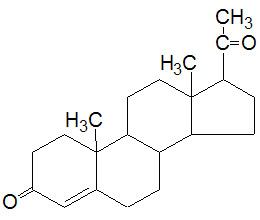Progesterone is estrogen’s partner. It is secreted primarily in the ovary after ovulation and is responsible for promoting implantation of the embryo and maintaining pregnancy. It is the major hormone of pregnancy. During a woman’s menstrual cycle estrogen causes the uterine endometrium to grow and prepare for a pregnancy. Progesterone comes in about mid-cycle and says “OK, that’s enough”, and modulates the building effect of estrogen and finishes preparation for gestation and then hangs around in high levels if implantation occurs to make sure everything stays calm and supportive for the next nine months. Estrogen builds, makes things grow, makes us excited, sometimes irritable, and repairs tissues. Progesterone is like the grandmother who comes in and calms everything down. It modulates not only endometrial growth but also decreases breast tissue proliferation. It has a calming, anti-anxiety effect on the nervous system through stimulation of GABA receptors, especially when given orally.
Perimenopause and low progesterone
By the time a woman reaches her forties, she is beginning to have periodic anovulatory cycles (a menstrual cycle where no egg cell is released from the ovaries) and her hormone levels are declining. Progesterone in particular takes a precipitous fall and can have serious consequences. Estrogen left unchecked can lead to heavy bleeding, fibroid tumors, and breast tissue proliferation. Breast cancer begins to raise its ugly head frequently in women in their forties. This increase is not due to estrogen excess but to progesterone deficiency. Studies show that women who had the highest progesterone levels at the time of diagnosis of breast cancer had the least invasive cancers and the best prognosis. The fluctuations in hormone levels can also lead to migraines and increasing emotional turmoil varying from apathy to irritability to overt rage. During perimenopause, progesterone can alleviate these symptoms as well as protect against breast cancer. Progesterone is a “feel good” hormone and promotes a feeling of contentment.
Benefits of progesterone in menopause
Progesterone along with estrogen promotes a healthy heart and healthy lipid (cholesterol) levels. It works with estrogen to prevent cardiovascular disease. It prevents endometrial cancer in women on estrogen with a uterus and prevents breast proliferation and breast cancer in all women. All women need progesterone – even if they have had a hysterectomy. Progesterone lifts mood, alleviates insomnia and hot flashes, promotes a feeling of contentment, and prevents osteoporosis.
Though used interchangeably in literature, by the media, and by physicians, progesterone and Provera are not the same biochemically and they have very different effects on the body. Provera, which is a progestin, has been shown in study after study to increase the risk for breast cancer, depression, weight gain, blood clots, and cardiovascular disease (stroke and heart attacks). It is not safe and in my opinion, it should not be used. Progesterone has been shown to not only be safe but to protect the breast and endometrium against breast cancer and uterine cancer as well as work with estrogen to decrease the risk for cardiovascular disease. Bio identical micronized progesterone is available commercially as Prometrium in 100 and 200 mg tablets, and can be compounded by a compounding pharmacy in varying doses for oral, sublingual, or topical use. It can do anything that Provera can do but better and is much safer. Make sure your doctor prescribes bio identical progesterone, NOT medroxyprogesterone or Provera, for you.
Please see Dr. Neal Rouzier’s book, “How to Achieve Healthy Aging”, for a wealth of information and a plethora of studies documenting the benefits of natural micronized progesterone.





The graphic highlighting the difference between natural Progesterone and synthetic Provera helps illustrate that synthetic drugs do not replicate what our bodies produce!
I appreciate this series and am learning a lot from it.
Great blog, great information. Really appreciated the attention to difference between natural and synthetic progesterone. Thanks!
Thanks, Meaghan. Hope I can help prevent stories like mine.
I have been watching this blog for a while now. It feels like every time I come back that there is updated articles. Keep up the great job. Thanks
[…] is a progestin and is completely different from progesterone, which is also made from soy and is bio identical to the hormone in your body. Doctors unfamiliar […]
[…] Nunley, MD Skip to content HomeAbout ← Progesterone – The Great Mediator DHEA – Your Inner Warrior → March 21, 2011 · 3:31 pm ↓ Jump to […]
[…] “defer” to cortisol. The thyroid needs cortisol to govern its function. The production of progesterone, estradiol, testosterone, DHEA, pregnenelone; all hormones of the steroid hormone cascade, will […]
[…] under cholesterol in the hormonal cascade and is a precursor for all the other steroid hormones: progesterone, cortisol, estradiol, testosterone, and DHEA. Like the other steroid hormones, pregnenolone […]
Absolutely written content , thanks for information .
[…] Progesterone is NOT Provera marshanunleymd.wordpress.com […]
Keep up the fantastic piece of work, I read few posts on this internet site and I conceive that your site is real interesting and has bands of good information.
Wow! I’m just genuinely digging the design:theme for the blog. It’s simple, though great. Frequently it’s hard to get that “perfect balance” between user friendliness as well as appearance. I actually must say that you’ve done a superb job with this. In addition, this blog loads super fast for me with Chrome. Excellent Blog site.
[…] Progesterone is NOT Provera marshanunleymd.wordpress.com […]
[…] “defer” to cortisol. The thyroid needs cortisol to govern its function. The production of progesterone, estradiol, testosterone, DHEA, pregnenolone: all hormones of the steroid hormone cascade, will […]
[…] for Breast Cancer – Women in the WHI who took estrogen and progestin (not progesterone) had an increased risk for breast cancer with 2.6 breast cancer deaths per 10,000 women compared to […]
[…] decline in hormones DHEA, testosterone, progesterone and estradiol causes accelerated bone loss. Hormone replacement therapy is effective in slowing and […]